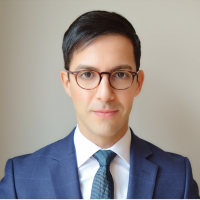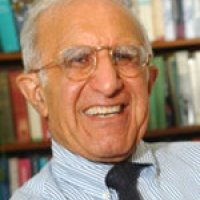Rouhani: Challenges at Home, Challenges Abroad
A panel of Iran experts discussed the current domestic and foreign policy issues that the new Iranian President-elect Hassan Rouhani will face as he takes office next month, and provided analysis on the new administration’s potential approach to solving these challenges.
On July 22, the Middle East Program at the Woodrow Wilson Center hosted a meeting, “Rouhani: Challenges at Home, Challenges Abroad” with Roberto Toscano, former Wilson Center Public Policy Scholar, President of the Intercultura Foundation, and former Italian Ambassador to Iran and India; Suzanne Maloney, Senior Fellow of Foreign Policy, Saban Center for Middle East Policy, Brookings Institution; Ali Vaez, Senior Iran Analyst, International Crisis Group; Shervin Malekzadeh, Visiting Assistant Professor, Swarthmore College, and Bijan Khajehpour, Managing Partner, Atieh International. Haleh Esfandiari, Director of the Middle East Program, provided introductory remarks. Shaul Bakhash, Clarence J. Robinson Professor of History at George Mason University, moderated the event.
Esfandiari introduced the panel by stating that Rouhani’s election took many by surprise in both Tehran and Washington. She asserted that his election is particularly significant during such a critical time in Iran due to his pivotal role as an insider in the regime and his experience in many key government roles.
Bakhash provided an overview of the international community’s response to the election results, noting that there have been three types of reactions: optimistic, pessimistic, and skeptical. While the optimists view Rouhani’s election as a turning point in Iran’s domestic and foreign policy approach, the pessimists do not consider him to be any different than his predecessors in terms of his stance on the nuclear program or other foreign policy issues. The skeptics, he said, believe him to be well-intentioned yet remain uncertain about his impact considering his power limitations as president.
Toscano discussed Rouhani’s potential impact in terms of nuclear negotiations and sanctions. He asserted that sanctions emerged as one of the major issues during the presidential campaigns, and this is a clear indication that sanctions have been effective. Toscano stated that Rouhani’s political style will most likely affect negotiations going forward. He explained, “the fact that he is an insider is a plus not a minus,” because his position enables him to get authorization from the Supreme Leader to adopt a more flexible position on some issues, including the nuclear negotiations.
Maloney focused the discussion on the challenges facing the new administration, Washington’s diverse interpretations of the election results, and implications moving forward. She argued that domestic and regional conditions have raised concern in Iran; therefore, the regime decided to use the elections to change its course on key issues including the nuclear negotiations. In addressing the challenges, Maloney noted that Syria is certainly on top of the list of concerns for Rouhani, and that he should approach the situation cautiously, since it could potentially be used by those who oppose him to damage his reputation internationally. She concluded on a positive note by stating that she is hopeful that both administrations will choose to resolve their issues diplomatically and that finally, “Washington may have a partner on the Iranian side that sees it the same way.”
Vaez elaborated on the obstacles in moving the nuclear negotiations and sanctions relief forward. He noted that the right to enrichment has been Iran’s recurrent bottom line for the past 11 years, and that the West is resistant to recognize this right explicitly. According to Vaez, when negotiations resume, Rouhani should – and most probably will – take confidence-building steps, such as stopping at 20 percent enrichment and aim for implicit recognition. In addition, he stated that congressional sanctions, which make up 60 percent of the United States’ sanctions, have high standards to be lifted. Thus, unless there is a significant reorientation in Iran’s domestic and foreign policy approach, there is unlikely to be sanctions relief any time soon. Nonetheless, Vaez is optimistic that Rouhani’s election is a great opportunity to gain positive momentum towards de-escalation.
Malekzadeh provided a first-hand account of the atmosphere of the elections in Iran. He noted that a month prior to the elections, enthusiasm seemed to be non-existent due to people’s hesitations on whether to vote or not. However, the televised debates shifted the atmosphere. Malekzadeh asserted that Rouhani’s endorsement by Khatami and Rafsanjani, as well as his campaign during the final week, sealed his victory in the elections. He described the 2013 elections as, “the conclusion of the 2009 elections,” and concluded that there is an implicit understanding between the people and the regime that, “Iran cannot become Syria,” and change needs to occur.
Khajehpour discussed the key economic challenges facing the new administration and provided recommendations for potential solutions. He identified high inflation, economic stagnation, and unemployment among others as key issues that need immediate attention. According to Khajehpour, Iran’s economy is certainly bound to improve under the new administration as more knowledgeable and experienced elements will be absorbed into Rouhani’s cabinet. He noted that Rouhani’s team has already come up with pragmatic policies to boost the economy such as removing barriers for private sector business among others. He concluded by highlighting Rouhani’s access to a number of networks and emphasized that it will facilitate implementation of reforms.
By Afarin Dadkhah, Middle East Program
Please see Shervin Malekzadeh's paper below based on his presentation.
Speakers



Hosted By

Middle East Program
The Wilson Center’s Middle East Program serves as a crucial resource for the policymaking community and beyond, providing analyses and research that helps inform US foreign policymaking, stimulates public debate, and expands knowledge about issues in the wider Middle East and North Africa (MENA) region. Read more
